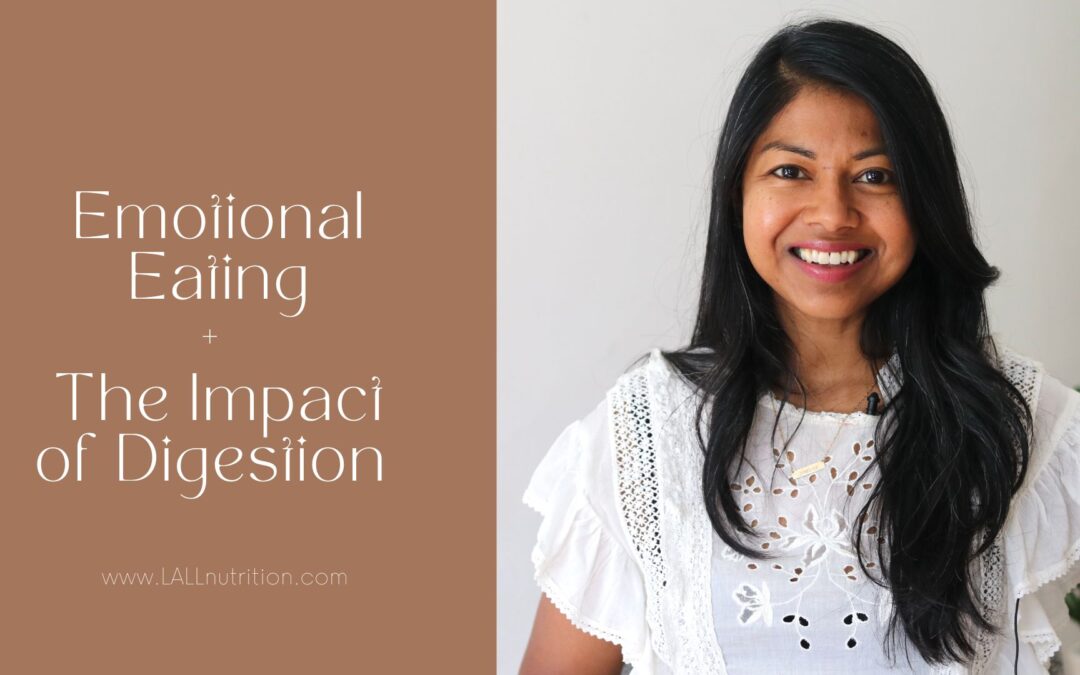Hello love,
Today I want to share with you how food and your mood impacts your emotional eating.
I wanted to share about this because when we are emotional eaters, our relationship to food is usually disconnected. We have had this battle with food because we go to food to soothe us. We feel out of control with it, and we don’t know how to truly connect with it.
If I think back to my own journey with emotional eating, I was really disconnected from food. I just thought I was out of control with food. I didn’t know how to control food or my body. So I was looking to all of these diets and these things externally to me to tell me what foods to eat. I didn’t have a connection to food. I didn’t know how foods felt in my body. I was going by this outside template, not really knowing how to tune into my body and how it felt because my goal was just to look a certain way.
As I moved through my journey, I realized that I needed to have a better connection to food. I wanted to have a healthier relationship to food. I didn’t want food to be an enemy. This is a piece of the puzzle in resolving your emotional eating.
Reasons to be aware of your eating patterns
A lot of the times when I am working with women and I’m looking at their relationship to food, the place that we start is I have them keep a Food and Mood journal. This is important for a few reasons. First, I want to see how they’re typically eating. Because a lot of the times we think that we’re eating in a “healthy” way, and usually there’s so much nutritional noise, we think we know what’s healthy. It’s not to say that we might not have an idea, but when I look at it, I can see holes because of my background is in holistic nutrition.
I have a certain method that I love my clients to focus on in order to create this relationship to food. I’m giving them a structure to flow from. The second reason we’re keeping this is to see if the foods that we’re eating are nourishing us or is there a lot of restriction and food rules. The third reason is to see when the emotional eating pattern is popping up, so it gives us a lot of information. And the fourth is just to see how we feel with certain foods.
From the journal I can see patterns – is it binging or emotional eating, mood issues with certain foods (even “health” ones).
From feeling shame to using your patterns to help you
So a Food and Mood journal is important. Usually with clients, what’s happened is that whenever they’ve kept a food journal prior to being in the program, it’s about macros, calories and punishing themselves. They don’t know how to use this as a tool to gain insight and awareness into their patterns.
So they’re very hesitant and resistant to this. But this is not about judging yourself. It’s about becoming aware of yourself and getting to acceptance to see what’s been going on. Because a lot of the times when we have this emotional eating pattern, we have a lot of shame. We hide from others and we hide from ourselves.
It can be scary because the moment we have to look at what we’re eating and doing. A lot of self judgment can come up. So we need to be in a safe space and going through a process so that that self judgment doesn’t spiral us into further shame and emotional eating.
Why Use a Food + Mood Journal?
A Food and Mood Journal is important for a few reasons. This is where we can start developing our relationship to food by seeing how foods feel in our body, by noticing if a strategy works, how foods are digesting, how foods are tasting to us, what feels good to us and what works for us.
Usually as emotional eaters we also have food rules. We can be restrictive, rigid in what we think is healthy and adhering to external rules vs. connecting with our body and experimenting.
A Food and Mood Journal can give us tons of insights. The 3 main things that I look at are:
1.How are foods digesting?
2. Are you nourishing yourself enough throughout the day?
3. Where are your emotional triggers?
Optimizing Digestion
In The Emotional Eating Evolution Program, we are working to optimize the way clients are eating so that digestion improves which improves mood. We’re pinpointing where those emotional eating triggers are and also discerning if we are in deprivation or restriction mode from dieting which can trigger binging.
The reason that we want to optimize our digestion is because it impacts mood which impacts the emotional eating pattern. I have a specific way I teach inside of The Emotional Eating Evolution Program on optimizing digestion, how to create meals that nourish you and satisfy the 4 components of hunger.
If we look at it from a food perspective, the foods we eat, the way we’re digesting and feeling after meals impacts our mood. If we’re eating foods that don’t agree with us, eat in a rushed state or emotionally eating, we’re going to notice the impact on digestion + mood.
Digestion + Mood
Digestion is important because in our small intestines and colon, we house our microbiome. The bacteria there (hopefully) is 80% beneficial to us.
They’re breaking down foods, creating neurotransmitters among other tasks. There’s a lot going on in our digestive tract. Our digestion impacts our brain bacause there is communication via the vagus nerve.
If we are producing neurotransmitters like serotonin, which about 95% is produced in the gut, it is transported to the brain. That means we’re having great digestion, everything is optimized. But if we are eating in a way where digestion is poor, that means we’re creating more neurotoxins. If we have incomplete digestion of proteins or fats or carbohydrates, if we have large pieces of food, the bacteria that are not so beneficial are going to feed off of that and produce neurotoxins. That’s what can lead to brain fog, irritability and overall poor mood.
We’re also creating gas in our digestive system, which is physically uncomfortable.
So we have to look at digestion as the starting point, because when we eat, that’s the first access point of food into our body. Our digestive tract is external to our body so if we are not digesting well this impacts the absorption of nutrients into the body.
Is digestion everything we need to resolve emotional eating?
Is digestion everything around emotional eating? Is this going to solve your emotional eating? No, but this is one piece and it’s a key. That’s why emotional eating is so multilayered.
Digestion tends to be a factor because when we’re emotional eaters, we are also eating in a stressful state. We’re emotionally eating. So our digestive system is under a lot of stress and that just compounds the issue. So food and mood are really interconnected. There’s so much more in terms of the types of foods we’re eating and how we’re digesting it.
There are key steps to making sure you’re digesting well from a physical level, in terms of timing, from a food perspective, and from an emotional perspective. There’s so much that goes into digestion, and so all of that is covered inside of The Emotional Eating Evolution Program. But I hope this has given you more of an overview of the importance of digestion and the connection to food. That we need to have awareness of this. This is not about macros, calories and to judging ourselves. This will help us understand ourselves more and soften into more acceptance of our body, knowing how we relate to food.
Next Steps
Digestion is one key piece in resolving your emotional eating. If you’d like to find out more about The Emotional Eating Evolution Program with the two other key areas that are important aside from True Nourishment, which are Body Acceptance and Emotional Wellness, you can find out more about the program HERE. This is a step by step process and methodology. The program is full of support, accountability and in depth somatic meditation sessions in a 12 week container so that you can resolve your emotional eating from the root.
To optimization,
Michelle
Certified Holistic Nutritionist Specializing in Emotional Eating


